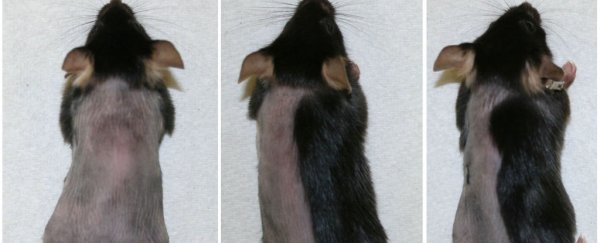Baldness is a problem that scientists have been tackling for a long, long time - you won't find many men or women happy to be losing their hair prematurely, and all kinds of cures and strategies have been suggested over the years. Some modern treatments can limit the effects of male and female pattern baldness, but we're still searching for something that can actually make the hairs grow back as they once did.
That's why new research from the Columbia University Medical Centre in the US is so exciting: they've announced the development an enzyme-inhibiting drug that in some cases has been shown to restore hair growth. The team has been focusing on alopecia areata (spot baldness), but the findings could potentially be used more broadly to tackle different types of hair loss.
The family of enzymes in question is known as Janus Kinase (JAK), as Gizmag reports. By limiting the activity of the JAK enzymes, found in hair follicles, scientists were able to stimulate hair growth in their lab mice after just 10 days. What's more, while the drug can be taken orally, applying it directly to the skin resulted in even more hair growth. This suggests the treatment is somehow interacting with the hair follicles to prevent spot baldness from occurring.
Hair follicles naturally go through cycles of growth and hibernation: typically around 10 percent of the hairs on your head are resting at any one time, ready to ramp up production again when needed. A variety of factors can interrupt this natural cycle, though - in the case of alopecia areata, it's because the immune system mistakenly attacks the follicle, thanks to those JAK enzymes.
Essentially, what the new drug seems to be doing is restarting hair production. After three weeks of treatment, the researchers reported that their lab mice had grown back almost all of their original hair - and while there's a lot of work to be done to get a similar drug ready for human consumption, it's a promising development that taps into the body's natural processes of growing hair.
The US Food and Drug Administration (FDA) has already approved the drugs the team is working with for the treatment of blood diseases and rheumatoid arthritis, so that's one hurdle out of the way.
"What we've found is promising, though we haven't yet shown it's a cure for pattern baldness," said one of the team, Angela Christiano. "More work needs to be done to test if JAK inhibitors can induce hair growth in humans using formulations specially made for the scalp. There aren't many compounds that can push hair follicles into their growth cycle so quickly."
The study has been published in the journal Science Advances.
